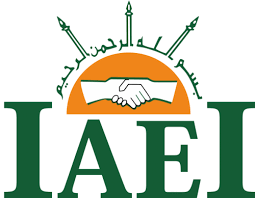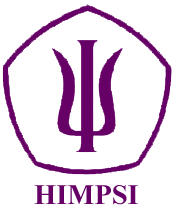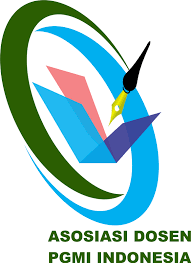SUPERVISI KLINIS SEBAGAI UPAYA PENINGKATAN KOMPETENSI GURU PAI
Studi pada MTs Swasta Istiqamah Talu
DOI:
 https://doi.org/10.37859/jsi.v4i1.2440
https://doi.org/10.37859/jsi.v4i1.2440
Abstract
Teachers' ability must be continuously improved because they are as a benchmark of the quality of education, a form of teacher improvement in state-shaped educational institutions has many varied forms, this is different from that obtained by private educational institutions such as Private MTs Istiqamah Talu. This study aims to describe how clinical supervision is carried out in Private MTs Talu as an effort to improve the competence of Islamic Religious Education teachers. For the achiever of this goal, this research was designed using qualitative approach, while the research data source consists of madrasah head, supervisor and PAI teacher, to obtain data from the source that has been determined by researchers using observation techniques, interviews and documentation studies, research data is analyzed descriptively. From the results of the research it is known that the implementation of clinical supervision of PAI teachers starts from the preliminary stage, implementation and feedback stage, clinical supervision activities can improve the competence of PAI teachers, especially professional competencies.
Downloads
References
BULUNUZ, N., GÜRSOY, E., KESNER, J., GÖKTALAY, Ş. B., & SALİHOĞLU, U. M. (2014). The Implementation and Evaluation of a Clinical Supervision Model in Teacher Education in Turkey: Is It an Effective Method? Educational Sciences: Theory & Practice, 14(5), 1823–1833. https://doi.org/10.12738/estp.2014.5.2085
Demchuk, A., Karavaeva, Y., Kovtun, Y., & Rodionova, S. (2015). Competencies, Learning Outcomes and Forms of Assessment: the Use of Tuning Methodology in Russia. Tuning Journal for Higher Education, 3(1), 149–185. https://doi.org/10.18543/tjhe-3(1)-2015pp149-185
E.J, K. K., & Osman, A. (2012). Use of Clinical Supervision Cycle in the Assessment of Teacher Trainees in Physical Education in Kenya: A Study of Teacher Colleges in Rift-Valley Zone. Journal of Education and Practice, 3(9), 159–167.
Erlina, Harun, C. Z., & Usman, N. (2017). Kinerja Guru Sertifikasi dalam Meningkatkan Pembelajaran pada Madrasah Aliyah Negeri (MAN) Beureunuen Kabupaten Pidie. Jurnal Magister Administrasi Pendidikan, 5(3), 147–153.
Gani, A. (2021). Improving The Ability of Implementing Fun-Based Learning Through Structured Clinical Supervision on Mathematics Teachers at SMA Negeri 1 Barru, Indonesia. Journal of Applied Science, Engineering, Technology, and Education, 3(1), 195–202.
Gürsoy, E., Kesner, J. E., & Salihoglu, U. M. (2016). Clinical Supervision Model in Teaching Practice: Does it Make a Difference in Supervisors’ Performance? Australian Journal of Teacher Education, 41(11), 61–76. https://doi.org/10.14221/ajte.2016v41n11.5
Hakim, R., Ritonga, M., Khadijah, & Susanti, W. (2020). Implementation of Contextual Teaching and Learning in Islamic Education at Madrasah Diniyah. Journal of Advanced Research in Dynamical & Control Systems, 12(02), 3326–3332. https://doi.org/10.5373/JARDCS/V12I2/S20201455
Hoque, K. E., Kenayathulla1, H. B. B., Subramaniam, M. V. D., & Islam, R. (2020). Relationships Between Supervision and Teachers’ Performance and Attitude in Secondary Schools in Malaysia. SAGE OpenAGE, 1–11. https://doi.org/10.1177/2158244020925501
Husna, S. A., Ritonga, M., Lahmi, A., Saputra, R., & Ayu, S. (2020). The Teachers Unpreparedness in Carrying Out Islamic Education Learning using the Revised 2013 Curriculum in Elementary School. European Journal of Molecular & Clinical Medicine, 7(2), 1520–1528.
Indonesia, D. K. M. D. J. P. I. K. A. R. (2019). Keputusan Menteri Agama Nomor 183 Tahun 2019 Tentang Kurikulum PAI dan Bahasa Arab pada Madrasah. In KMA Nomor 183 dan KMA 184. Kementerian Agama.
Kayıkçı, K., Yılmaz, O., & Şahin, A. (2017). The Views of Educational Supervisors on Clinical Supervision. Journal of Education and Practice, 8(21), 159–168.
Kustiah. (2019). Supervisi Klinis Sebagai Upaya Meningkatkan Kompotensi Guru Menyusun RPP Berorientasi HOTS. Journal of Basic Education Studies, 2(2), 53–62.
Lele, D. M., Setiawan, D., & Sulhadi. (2018). Clinical Supervision Instrument Development f or Junior High School Teacher Based on Android. Journal of Educational Research and Evaluation, 7(1), 94–100. http://journal.unnes.ac.id/sju/index.php/jere
Leonard. (2015). Kompetensi Tenaga Pendidik di Indonesia: Analisis Dampak Rendahnya Kualitas SDM Guru dan Solusi Perbaikannya. Jurnal Formatif, 5(3), 192–201.
Masmin, D. N. (2020). Penerapan Supervisi Klinis untuk Meningkatkan Kinerja Guru. Journal of Education Action Research, 4(4), 508–513. https://ejournal.undiksha.ac.id/index.php/JEAR/index%0APenerapan
Mena, Y., Supriyanto, A., & Burhhanudin. (2016). Pelaksanaan Supervisi Klinis dalam Meningkatkan Mutu Kinerja Guru di Sekolah Dasar. Jurnal Pendidikan: Teori, Penelitian, Dan Pengembangan, 39(1), 2194–2199.
Nurjanah, E., & Sofiawati, E. T. (2019). Implementation of Education Quality Improvement in Primary Schools Judging From Teacher Competency Test in Sukabumi Regency. International Journal for Educational and Vocational Studies, 1(7), 773–776. https://doi.org/10.29103/ijevs.v1i7.1785
Nurlaili, Ritonga, M., & Mursal. (2020). Muroja’ah Sebagai Metode Menghafal al-Qur’an Studi Pada Rumah Tahfiz Yayasan Ar-Rahmah Nanggalo Padang. Menara Ilmu, XIV(02), 73–82.
Purwoko, A. A., Andayani, Y., Muntar, & Diartha, I. N. (2017). Efforts in Improving Teachers’ Competencies Through Collaboration Between Teacher Forum on Subject Matter (MGMP) and Pre-Service Teacher Training Institution (LPTK). Jurnal Pendidikan IPA Indonesia, 6(1), 11–15. https://doi.org/10.15294/jpii.v6i1.8858
Putri, S. D., & Citra, D. E. (2019). Problematika guru dalam menggunakan media pembelajaran pada mata pelajaran ips di madrasah ibtidaiyah darussalam kota bengkulu. IJSSE: Indonesian Journal of Social Science Education, 1(1), 49–54.
Ritonga, M., Nazir, A., & Wahyuni, S. (2016). Pembelajaran Bahasa Arab Berbasis Teknologi Informasi dan Komunikasi. Arabiyat: Jurnal Pendidikan Bahasa Arab Dan Kebahasaaraban, 3(1), 1–12. https://doi.org/http://dx.doi.org/10.15408/a.v3i1.2879
Ritonga, M., Nazir, A., & Wahyuni, S. (2020). Pengembangan Model Pembelajaran Bahasa Arab Berbasis Teknologi Informasi & Komunikasi dalam dialektika Revolusi Industri 4.0 [Development of Arabic language learning Model based on information Technology & Communication in dialectic Industrial Revolution (Bambang, I. Naska, & F. Alrasi (eds.); Januari). Deepublish.
Rosa, A., Ritonga, M., & Nasrul, W. (2020). Penggunaan Media Berbasis Teknologi dalam Pembelajaran Pendidikan Agama Islam di Sekolah Menengah Pertama Negeri. Jurnal ISLAMIKA, 3(2), 36–43.
Rugaiyaha, Sulartinah, Kustandi, C., Rahmawati, D., Sujanto, B., Karnati, N., & Hartati, S. (2019). Clinical Supervision Using Information Technology to Improve Teacher Quality. International Journal of Innovation, Creativity and Change, 10(9), 328–347. www.ijicc.net
Sartika, F., Desriwita, E., & Ritonga, M. (2020). Pemanfaatan media pembelajaran dalam meningkatkan motivasi dan hasil belajar PAI di sekolah dan madrasah. Humanika, Kajian Ilmiah Mata Kuliah Umum, 20(2), 115–128. https://doi.org/10.21831/hum.v20i2.32598
Suharto. (2017). Kemampuan Guru dalam Mengembangkan Perangkat Pembelajaran IPS Berbasis Karakter (Studi pada Guru SMP Negeri 3 Geger Madiun). Gulawentah: Jurnal Studi Sosial, 2(3), 116–129. http://e-journal.unipma.ac.id/index.php/gulawentah
Susanti, E., Ritonga, M., & Bambang, B. (2020). Pengaruh Penggunaan Media Powerpoint Terhadap Minat Belajar Bahasa Arab Siswa. Arabiyatuna: Jurnal Bahasa Arab, 4(1), 179–191. https://doi.org/10.29240/jba.v4i1.1406
Suyasa, I. M. (2019). Meningkatkan Kemampuan Guru dalam Melaksanakan Pembelajaran yang Efektif Melalui Pelaksanaan Supervisi Klinis dengan Mengikuti Alur Pembelajaran Inkuiri. Jurnal Pedagogi Dan Pembelajaran, 2(3), 293–300.
Tanama, Y. J., Supriyanto, A., & Burhanuddin. (2016). Implementasi Supervisi Klinis dalam Meningkatkan Profesionalisme Guru. Jurnal Pendidikan: Teori, Penelitian, Dan Pengembangan, 1(11), 2231–2235.
Tisnelly, Ritonga, M., & Rasyid, A. (2020). Kompetensi Guru Pendidikan Agama Islam Madrasah Ibtidaiyah Negeri 1 Pasaman Barat Pasca Sertifikasi. Ruhama: Islamic Education Journal, 3(1), 45–56. https://doi.org/https://doi.org/10.31869/ruhama.v3i1.1940
Tyagita, B. P. A., & Iriani, A. (2018). Strategi Peningkatan Kompetensi Pedagogik Guru Untuk Meningkatkan Mutu Sekolah. Kelola:Jurnal Manajemen Pendidikan, 5(2), 165–176.
Veloo, A., Komuji, M. M. A., & Khalid, R. (2013). ScienceDirect The effects of clinical supervision on the teaching performance of secondary school teachers. Procedia - Social and Behavioral Sciences, 93(October), 35–39. https://doi.org/10.1016/j.sbspro.2013.09.148






